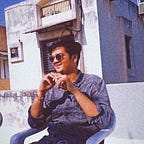The ghettoised frame seems as if it lasted for eternity when in reality it had only been seconds, the clear implication is the influence ‘Elvis’ himself has left on the pop-culture. There is a slight nod at drama, a vague urgency, but in a very lyrical fashion, it distracts the viewer’s attention from the unending emotional violence. Throughout the film, Austin Butler instead of mimicking tries to portray the nuances of human behavior, the camera follows as the actor seeps into the melancholic and subconsciously developed ethos of freighting consequences of loneliness and fame.
Visually Baz Luhrmann has made the film into a speculative but worthy piece of auto-biographical drama, Even the violence in the film does not feel gratuitous. It becomes after a point exhausting, but not tiring…If you’re familiar with the filmmaking of Baz Luhrmann, it wouldn’t take much time and thought for you to understand the necessities in his mind to make the visuals look like they look. Baz even in ‘The Great Gatsby’ took the actual descriptions of characters and places and tried to replicate them…Big poetic sets, juxtaposed images, chaos… Baz Luhrmann’s ‘Elvis’ does not only revolve around Elvis, Tom Hanks plays ‘Tom Parker’ and amidst all the visual chaos, the prosthetic-filled Tom Hanks does not really work.
“So, we beat on, boats against current, borne back ceaselessly into the past.” F. Scott Fitzgerald, ‘The Great Gatsby’
There are several instances of greatness in Elvis’s life, all are filled within moments of loneliness. These lineatic moments of loneliness are brewed in the hangover of post-world war America. Through the lens of music, Baz throws out a cultural map of America. Elvis constantly mentions ‘James Dean’ and how he would have loved to be like him on the screen. The real magic of the lens is when Elvis comes on stage, and wiggles the way he does, there’s poetry in the shot, Girls losing their minds and boys biting their lips in vexation, standing up with delicate indignation. It was a sign that Elvis has not left the building.
It is very interesting how; the film uses several modes of animation as narrative devices. It does really help to understand the point of the film “It’s lonely at the top” Elvis expanded the grammar of love and modeling. He was never just a medium of words and melody, he was always more than that. The language of progression; is important here…Elvis develops a charm that almost passes from, chamosite to lustful. Even with his growing waistline, Elvis rocked the stage as if there was nothing in the world…It’s a sign that Elvis has still not left the building.
I wonder if the transactional relationship between Elvis and his fans is solely based on needing and feeling needed? The stories would never be stories. Tom Parker during the first, concert at the international hotel talks about, Priscilla’s face when the girls are kissing Elvis, “She knew she could never compete with you guys (The fans) for the love that he felt from you” I wonder if that is a consequence of getting love from everyone, which in turn makes one lonely of the most immediate environment.
Murder of Gods in the great hotel halls.
He stays there, quite oftentimes. He’s an oftener addict. The streets and the people on it knew him as a homosexual. All the him, he and them stuff. He would love the he gods. He gods would often love him back. The only thing upsetting was, one evening going back to his hotel room, he fell and killed himself. The great gods often joke about him. Create stories about him, falling to death on the lazy hotel hall. (On a Tuesday night) ha-ha.
Elvis by the end of his life has no hope left. He still sang as if it was his last day on the planet, but a dissonance emerges in not just his music but his life, Elvis’s death is not a moment in time, it’s a cue card for us to understand that the great era of pop-culture has passed, That Elvis has now finally left the building.
